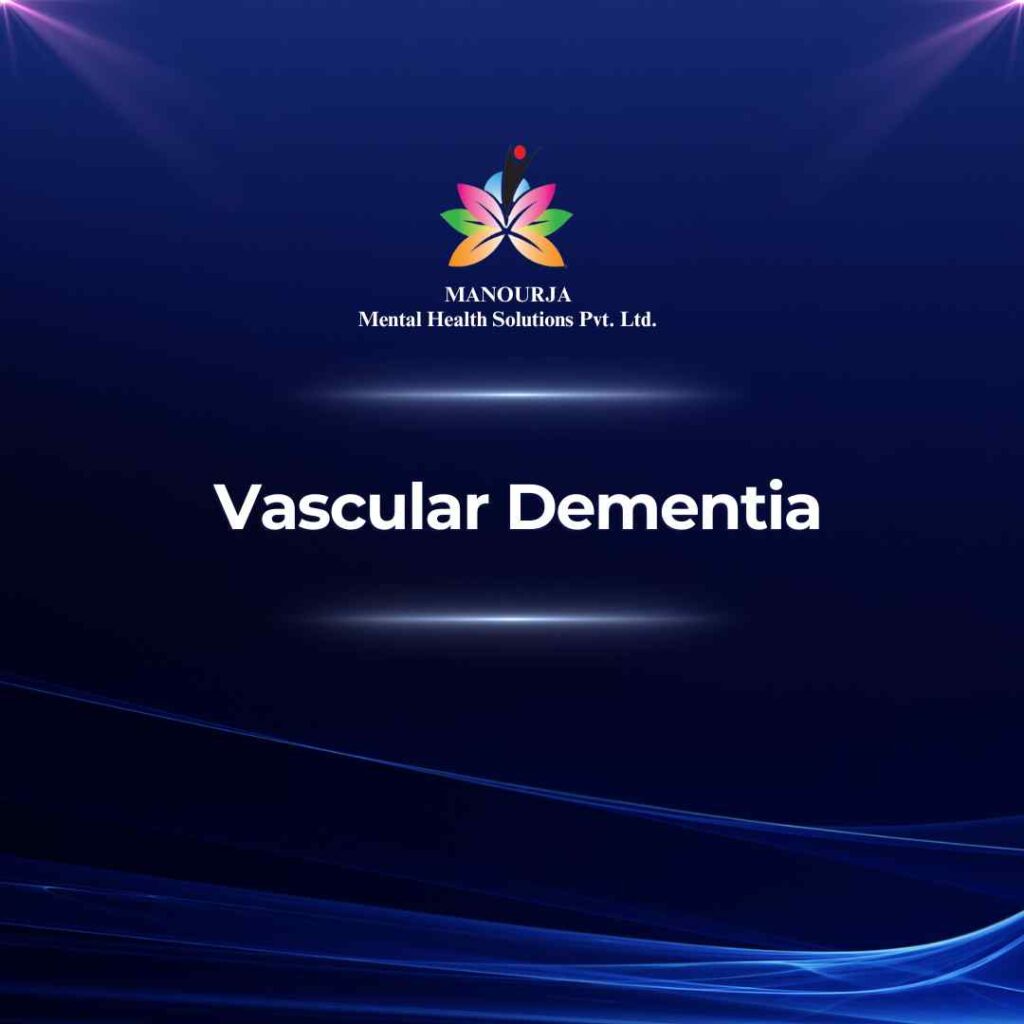Vascular Dementia

Vascular dementia is a type of dementia caused by reduced blood flow to the brain, typically due to damage to blood vessels. This restricted blood flow deprives brain cells of oxygen and nutrients, leading to cognitive decline and memory loss. Vascular dementia is the second most common form of dementia after Alzheimer’s disease.
Symptoms
The characteristics of vascular dementia can vary depending on the location and extent of the brain damage. Common features include:
- Memory Impairment: Similar to other types of dementia, individuals with vascular dementia may experience difficulties with memory recall, particularly in recalling recent events or information.
- Executive Function Deficits: Vascular dementia often affects executive functions such as planning, organization, problem-solving, and decision-making. Individuals may struggle with tasks that require cognitive flexibility and attention.
- Slowed Thinking: Cognitive processing may become slower in individuals with vascular dementia, affecting their ability to process information and respond to stimuli.
- Mood and Behavioral Changes: Mood disturbances such as depression, anxiety, irritability, and apathy are common in vascular dementia. Individuals may also exhibit changes in behavior, such as agitation, aggression, or social withdrawal.
- Motor Symptoms: Some individuals with vascular dementia may develop motor symptoms such as weakness, gait disturbances, or problems with coordination and balance.
- Speech and Language Impairments: Difficulty with speech and language may occur in advanced stages of vascular dementia, affecting communication abilities.
Forms
Vascular dementia can present in different forms, including:
- Multi-Infarct Dementia: This form of vascular dementia occurs as a result of multiple small strokes (infarcts) in the brain. Each stroke leads to damage in a specific area of the brain, resulting in cumulative cognitive decline.
- Strategic Infarct Dementia: In this form, damage to specific strategic areas of the brain, such as the thalamus or basal forebrain, leads to cognitive impairment. Strategic infarct dementia may result from a single large stroke or multiple small strokes affecting critical brain regions.
- Subcortical Vascular Dementia: Subcortical vascular dementia is characterized by damage to the small blood vessels deep within the brain, particularly in the white matter. This type of dementia often presents with cognitive slowing, difficulties with attention and information processing, and mood disturbances.
Treatment
Treatment of vascular dementia focuses on managing symptoms, slowing disease progression, and addressing underlying vascular risk factors. Strategies may include:
- Medication: Medications to manage underlying vascular conditions such as high blood pressure, diabetes, and high cholesterol may help reduce the risk of further brain damage and cognitive decline.
- Lifestyle Modifications: Adopting a healthy lifestyle, including regular exercise, a balanced diet, smoking cessation, and moderation of alcohol intake, can help reduce vascular risk factors and promote brain health.
- Cognitive Rehabilitation: Cognitive rehabilitation programs may help individuals with vascular dementia improve cognitive function, memory, and daily functioning through structured exercises and strategies.
- Behavioral Therapy: Counseling and behavioral therapy can help individuals and their caregivers cope with mood disturbances, behavior changes, and emotional challenges associated with vascular dementia.
- Supportive Care: Providing a supportive and stimulating environment, including social engagement, cognitive stimulation activities, and assistance with activities of daily living, can improve the quality of life for individuals with vascular dementia.
In summary, vascular dementia is a type of dementia caused by reduced blood flow to the brain, resulting in cognitive decline and memory loss. It can present in various forms, including multi-infarct dementia, strategic infarct dementia, and subcortical vascular dementia. Treatment focuses on managing symptoms, addressing underlying vascular risk factors, and providing supportive care to improve quality of life
At MANOURJA, we believe in the transformative power of counseling. Our experienced therapists offer a safe and supportive space where you can explore your thoughts, emotions, and challenges. Through personalized counselling sessions, we’ll work together to develop coping strategies, build resilience, and achieve lasting positive change. Discover the path to a healthier, happier you with MANOURJA counselling services.
MANOURJA Rehabilitation Services
At MANOURJA, we’re dedicated to helping you in rebuild your life, after difficult times. Our rehabilitation services focus on understanding what you need to move forward, whether you’re recovering from addiction, trauma, or any psychological – social challenges. We create personalized plans, that are all about helping you, regain your strength and find hope again. With a caring team by your side, you’ll have the support to make real progress and take steps toward a brighter, healthier future.
